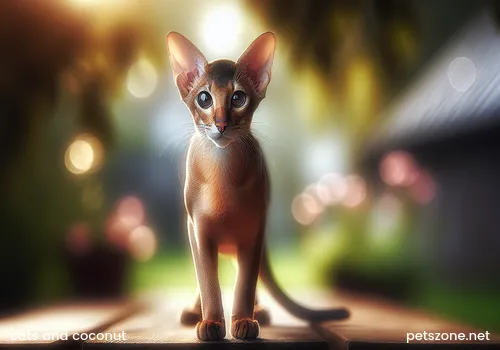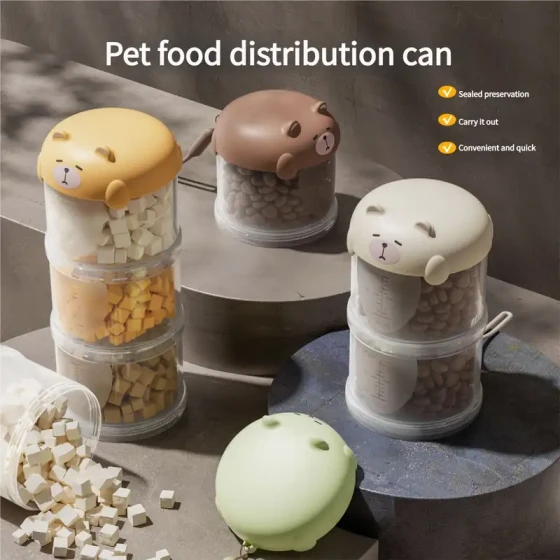Can Cats Eat Coconut_Analysis of the Health Effects of Coconut Milk on Cats
Can cats eat coconut? This article reveals the truth about cats and coconut.
To get straight to the point, although coconut (including coconut meat, coconut water, and coconut milk) is generally not toxic to cats, it is not recommended to feed it to them. Especially coconut milk, due to its very high fat content, is likely to cause digestive problems and other health issues in cats. Cats are strict carnivores, and their digestive systems are not suited to processing plant-based foods, especially foods like coconut that are rich in fat and fiber.

Why is coconut not suitable for cats?
To understand why coconut is not suitable for cats, first we need to understand their special dietary needs. Cats are obligate carnivores whose body structure and digestive systems have evolved over millions of years to get energy and nutrients primarily from animal proteins and fats. Their intestines are relatively short and lack enzymes needed to effectively digest large amounts of plant fiber and certain plant-based fats.
Coconut, whether coconut meat or coconut milk, contains a large amount of fat. For cats, excessive intake of fat is a big burden. It's like asking someone who normally eats light food to suddenly eat a large piece of fatty meat—the digestive system would definitely struggle. After ingesting high-fat foods, cats commonly show digestive discomfort, such as vomiting and diarrhea.
The effects of different forms of coconut on cats
- Coconut meat: Fresh or dried coconut meat contains high fat and fiber. Small pieces of coconut meat might not cause major problems, but if a cat eats a lot, the combined effects of high fat and fiber can easily cause digestive upset, resulting in soft stools or even diarrhea. In addition, dried coconut meat that is not chewed well might present a risk of digestive tract blockage.
- Coconut water: Coconut water contains less fat compared to coconut meat or coconut milk, but it is high in potassium. While drinking a small amount might not be a problem, excessive potassium intake could affect a cat's electrolyte balance, especially cats with heart or kidney conditions should avoid it. Also, cats are not sensitive to sweet tastes and usually do not show strong interest in coconut water.
- Coconut milk: This is the form that requires the most caution. Whether fresh or commercially packaged coconut milk, its fat content is very high. Commercial coconut milk often contains sugar, thickeners, preservatives, and other additives which are unnecessary or even harmful to cats. Feeding coconut milk significantly increases the risk of digestive system disorders, usually resulting in vomiting and diarrhea. In more severe cases, high fat intake might trigger pancreatitis, a very painful and potentially life-threatening condition requiring emergency medical intervention that can cost thousands or even tens of thousands of RMB.
- Coconut oil: Although some pet owners try to give small amounts of coconut oil to improve their cat's skin and coat condition, this practice is controversial and must be done under veterinary guidance. Coconut oil is essentially pure fat and carries the same risk of digestive problems and pancreatitis.
Besides digestive issues, what other risks are there?
- Allergic reactions: Although rare, cats can be allergic to components in coconut, showing symptoms such as skin itching and redness.
- Nutritional imbalance: Cats require high-quality animal protein as their main nutrition source. Using coconut or coconut milk as part of their diet can take up space in their diet, resulting in nutritional imbalance. Cats do not need large amounts of fat or carbohydrates from plants; their energy mainly comes from protein and animal fats.
- Obesity: Coconut products are calorie-dense, and frequent consumption can easily lead to excessive calorie intake, causing obesity. Obesity increases the risk of diabetes, arthritis, heart disease, and other conditions in cats.
What to do if a cat accidentally eats or consumes a small amount of coconut?
If your cat only licked a few sips of coconut milk or ate a tiny amount of coconut meat the size of a fingernail by accident, there is generally no need to panic. Closely monitor your cat over the next 12-24 hours for any abnormal reactions such as vomiting, diarrhea, lethargy, or loss of appetite. If symptoms are mild and quickly subside, it's usually not a big issue.
However, if your cat ate a larger amount of coconut products or shows persistent and severe vomiting, diarrhea, poor mental state, or abdominal pain signs (such as arching its back or refusing to let you touch its belly), you must contact a veterinarian immediately. These could be signs of acute pancreatitis or other serious digestive issues, requiring professional medical help.
Healthy cat treat choices
Instead of risking feeding coconut to your cat, choose some safer and healthier treats, such as:
- Cooked, unseasoned lean meat (chicken breast, beef, etc.).
- Cat treats specially formulated with healthy ingredients.
- Small amounts of cooked fish (be careful to avoid too many bones).
Remember, treats should not exceed 10% of your cat's daily total food intake.
Frequently Asked Questions (FAQ)
- Q: Can cats drink a little unsweetened coconut milk?
A: Even unsweetened coconut milk still has high fat content and is not recommended for cats. Commercial coconut milk often contains other additives as well. - Q: Is coconut oil good for a cat’s coat? Can it be fed?
A: While some claims suggest coconut oil benefits fur, this has not been widely confirmed in cats and feeding coconut oil carries risks of digestive upset and pancreatitis. Any addition of oils to cat food should be done only with veterinary advice. - Q: My cat ate coconut but seems fine; can I feed small amounts in the future?
A: An occasional small amount without immediate symptoms does not mean coconut is safe for cats. Some cats tolerate it better, but potential long-term risks or adverse reactions under certain conditions cannot be excluded. For your cat’s health, it is best to avoid feeding coconut. - Q: What if my cat really likes the taste of coconut?
A: Cats may show interest in high-fat foods, but that does not mean they are beneficial. Like humans liking sweets and fried foods, tasty doesn’t equal healthy. It’s better to redirect their attention with healthier cat treats or toys.
Summary
In summary, coconut and its products have low nutritional value and high potential risk for cats. Although not toxic, their high fat, fiber content, and possible additives can cause digestive upset, obesity, or more severe health problems. As responsible pet owners, we should prioritize nutritionally balanced foods that are friendly to the cat’s digestive system. If you have any questions about your cat’s diet, always consult a professional veterinarian first—they can provide the most authoritative and suitable advice for your cat.



